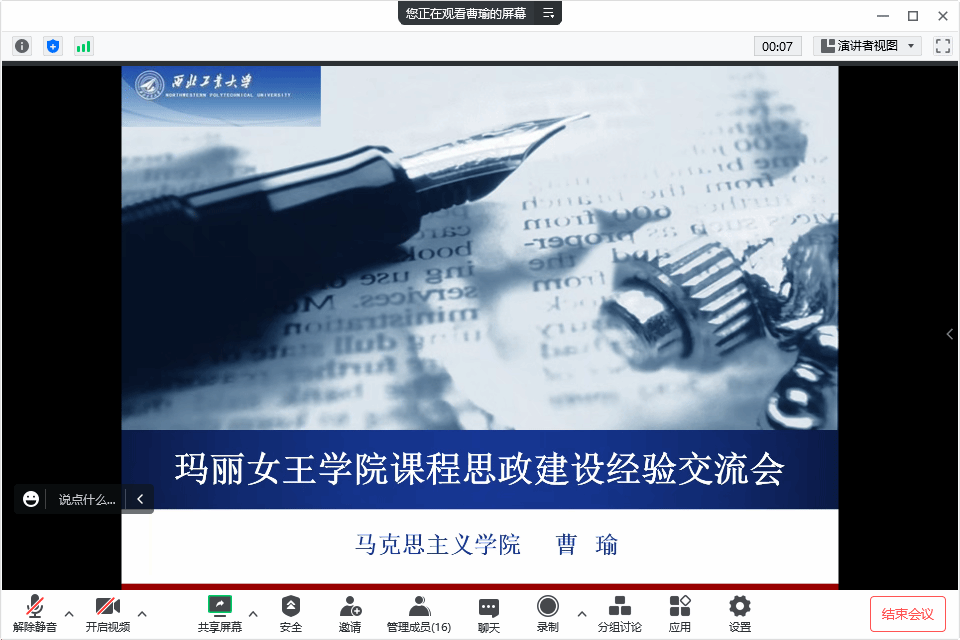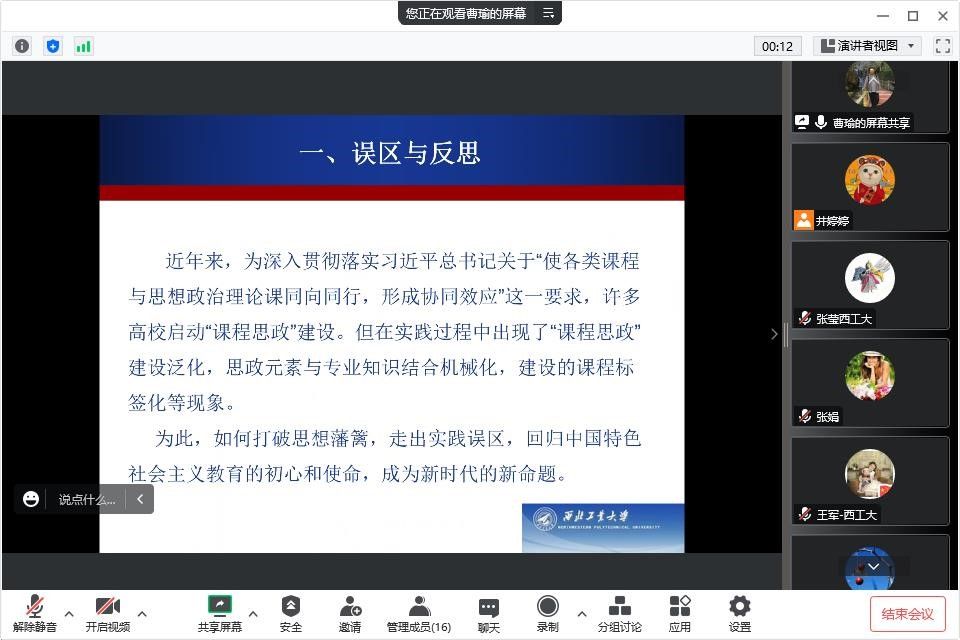QMES Held an Exchange Seminar on Ideological and Political Work of Curriculum
According to the requirements of NPU and in order to coordinate and promote the pilot work of the special reform of ideological and political courses construction of the School of Marxism, on November 23, 2022, QMES held an online exchange seminar on ideological and political work of curriculum, so as to implement the spirit of the 20th National Congress of Communist Party of China and Xi Jinping’s Educational Philosophy and the spirit of National Conference on Education, and coordinate and promote the construction of ideological and political courses and curriculum ideological and political work and implement the basic task of moral education.
The seminar was presided over by Dai Fuping, Secretary of the Party Committee of QMES. Professor Cao Yu from the School of Marxism gave detailed guidance on the ideological and political work of curriculum. Professor Yan Yi and Professor Zheng Zebang discussed the problems of the ideological and political construction of curriculum and exchanged the experience of it. A total of 10 teachers attended the seminar.
First, on behalf of QMES, Fan Xiaoli extended her welcome towards the teachers, and gave a detailed introduction to the construction situation of ideological and political work of QMES. She also introduced the work plan of “promoting and coordinating the ideological and political courses and curriculum ideological and political work. She pointed out that the summary of the experience and the theoretical learning of the curriculum ideological and political work as well as the improvement of the curriculum ideological and political educational level would help implement the fundamental task of morality education.

Professor Cao Yu pointed out the main problems in the ideological and political construction of the curriculum, analyzing the problems of the content, structure and function in the process of curriculum ideological and political construction. Based on the principles of the coordinated construction, Professor Cao Yu explained how to excavate, promote and implement the curriculum ideological and political construction to help teachers find more appropriate “ideological and political points”, “entry points” and “integration points” in the process of the curriculum ideological and political construction.

Professor Yan Yi introduced the experience of curriculum ideological and political construction of the module “Polymer Degradation”. By telling the stories of scientists, the educational methods of Marxism and the cultivation of scientific spirit were combined to foster students’ engineering ethics, craftsmanship spirit, and responsibilities and missions of serving the country through scientific and technological innovations, which helped students develop rigorous and meticulous scientific attitude.
Professor Zheng Zebang put up questions on how to combine the curriculum content and ideological and political education, and the evaluation indicators of ideological and political construction of science and engineering courses. Professor Cao Yu answered the questions thoroughly and said that it was very important to instill the value of ideological and political courses. He noted that taking ideological and political cases from the curriculum and combining the ideological and political education with specific disciplines was the next step.
Finally, Dai Fuping gave a summary towards this seminar. He hoped that the exchange seminar would help the teachers’ understanding of the spirit of the 20th National Congress of the Communist Party of China and Xi Jinping Thought on Socialism with Chinese Characteristics for a New Era. He hoped that the Marxist theory would be used to cultivate the young students. He also hoped that teachers could look for more ideological and political elements and learn from the outstanding cases to build the curriculum ideological and political material library and enrich the teaching materials of ideological and political courses and curriculum ideological and political work.
Picture: Jing Tingting
Text: Jing Tingting
Editor: Wu Sijia
Review: Dai Fuping

